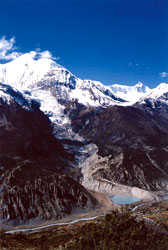|
|
| TERMINAL MORAINE: The retreating Gangapurna Glacier has left an expanding lake at its snout in the Manang Valley. Even if international commitments on cutting greenhouse gases are agreed in Bali this week, glaciers worldwide will continue retreating well into the end of this century. |
The best way to save the Maldives from drowning is not to fly there anymore. The most effective way to stop glacial retreat in the Himalayas may be to stop burning fossil hydrocarbons to go to Nepal for a trek.
The UN's crucial climate convention that ends in Bali on Friday could save the Maldives and the Himalayas from catastrophic climate change, but only if all the 190 participating countries agree on a 'roadmap' for ambitious emission cuts in the next five years.
The 15,000 delegates emitted an average of two tons of carbon each to attend the Bali meet. So, US senator Ed Markey of Massachusetts decided to become carbon neutral by delivering a speech via his avatar in Second Life.
For the past two weeks, negotiations here have been stuck in a tug of war between rich countries, which don't want to pay for cumulative emissions, and large polluters like China and India balking at having to cut back without adequate financial safeguards.
The Intergovernmental Panel on Climate Change (IPCC) has said average global temperatures should not be allowed to rise above two degrees. For this, the draft Bali declaration wants rich countries to slash emissions between 25 and 40 per cent by 2020. The Europeans say they will be down to 30 percent of their 1990 levels in 12 years.
Bali marks 10 years since the signing of the Kyoto Protocol, which has been ratified by most countries except the US. But even Kyoto signatories like Japan, Canada, and most recently Australia, are resisting the more ambitious targets being debated in Bali.
In stark contrast, China announced its own cuts and earned praise in Bali for agreeing to meet international commitments. India has been largely silent here, but its blame-throwing on rich polluters is not seen as being very helpful.
The American government is isolated not just internationally but also within its own country by progressive figures such as California governor Arnold Schwarzenegger, Al Gore and a network of mayors. By being so flexible, the Chinese have weakened the American bargaining position and exposed its intransigence.
For smaller countries like Nepal, the focus is on maximising benefits from a new Adaptation Fund so they can switch to cleaner and more efficient energy and pay for mitigation.
The Nepali delegation in Bali has been lobbying to add the word 'degradation' to an agreement on Reducing Emissions from Deforestation (RED). It's not just semantics. Nepal is entitled to compensation under the Clean Development Mechanism (CDM) for its dramatic successes in bio gas, microhydro and community forestry for carbon not emitted. Money could also be available to mitigate glacial lake outbursts. The fact that Nepal's environment minister resigned in Kathmandu during the meeting here doesn't seem to have made much difference. "We are not the culprits, we are the victims of climate change," says Sandeep Chamling Rai of WWF Nepal. "Our intention here is to take advantage of the package of technology transfer, adaptation and financial help that will be negotiated in Bali."
Although they are not major polluters, smaller South Asian countries will bear the brunt of climate impacts this century. The Maldives will be submerged, one-third of Bangladesh could go under, and melting Himalayan glaciers may trigger water wars in Asia.
"The science shows that global warming is rapidly melting glaciers," warns the Nepali head of the Asia-Pacific division of the United Nations Environment Programme (UNEP), Surendra Shrestha. "In 50-100 years they may be gone."
UNEP says the retreat of glaciers is most rapid in the Andes, but is also speeding up in the Himalayas, and by 2100 up to 80 per cent of its ice cap could melt with potentially cataclysmic ecological and political consequences downstream.
Nepal's foremost glaciologist, Pradeep Mool of ICIMOD, told a panel in Bali on Thursday: "When the ice melts, glacial lakes grow dangerously big. And when the water towers go, Himalayan rivers will go dry. We better start preparing for these things"



